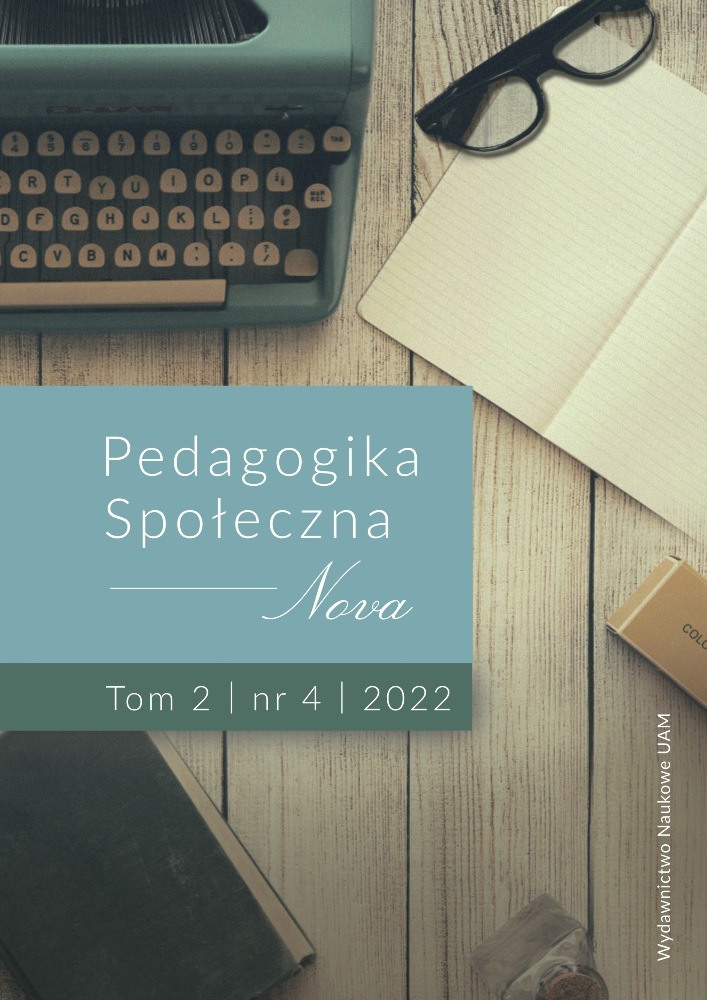Abstract
Contemporary reality is a time of great changes, of which we are observers as well as participants. The changes which are taking place right in front of our eyes provoke us to search for the answers to the question of how to transform social systems so each person retains their full rights without violating the rights of others. One of the disciplines that undertake scientific and practical reflection on the interpre- tation of social phenomena is pedagogy, including social pedagogy. While analyzing the place of man in the contemporary world, educational processes and their determinants, social educators constantly look for the possibility of creating a social system in which human rights will be respected. Currently, social educators are faced with the necessity to preserve the achievements as well as simultaneous need for updating research fields and their practical application.
Recent years have been a time of macro-environmental influences and processes taking place in them, among which the most obvious migration trends have emerged, caused not only by the desire to im- prove economic conditions, but also by the need to save lives as a result of war aggression. The world is constantly struggling with violence, intolerance, environmental degradation and its consequences, with the pandemic and its consequences. Describing these problems is the duty of social educators who are interested in people. Today the fate of an individual is more closely linked to societies around the world than ever. Therefore, the task of social pedagogy is to analyze reality and indicate the need for changes that will enrich human life and make ones more creative.
References
Andrejuk K., Jacy imigranci rejestrują się jako bezrobotni? Dynamika bezrobocia wśród cudzoziemców w RP, „Studia Migracyjne – Przegląd Polonijny” 2018, 2(168), s. 93–110. https://doi.org/10.4467/25444972SMPP.18.021.9147 DOI: https://doi.org/10.4467/25444972SMPP.18.021.9147
Czarnecki P., Pedagogika społeczna. Podstawowe pojęcia i definicje, „Społeczeństwo i Edukacja, Międzynarodowe Studia Humanistyczne” 2012, nr 1, s. 389–414.
Danielewicz W., Pedagogika społeczna w poszukiwaniu i budowaniu nowej rzeczywistości – perspektywa czasu i przestrzeni, [w:] M. Sobecki (red.), Pedagogika wobec wyzwań współczesności. Humanistyczny wymiar kapitału ludzkiego, Łomża 2010, s. 42–62.
Folkierska A., Pytanie o pedagogikę, Warszawa 1990.
Gąsior H., Pedagogika społeczna: jej teoretyczna i utylitarna aktualność, „Chowanna" 1995, nr 2, s. 88–100.
Jarecki W., Imigracja zarobkowa w Polsce. Stan i perspektywy emigracji z Ukrainy do Polski, „Zeszyty Naukowe Uniwersytetu Ekonomicznego w Krakowie” 2017, 4(964), s. 135–151. https://doi.org/10.15678/ZNUEK.2017.0964.0408 DOI: https://doi.org/10.15678/ZNUEK.2017.0964.0408
Małek A., Matka, żona, migrantka, https://ruj.uj.edu.pl/xmlui/bitstream/handle/item/83267/malek_matka_zona_migrantka_2010.pdf [dostęp: 6.04.2022].
Modrzewski J., Stanisława Kowalskiego poznańska szkoła pedagogiki społecznej, „Pedagogika Społeczna” 2019, 4(74), s. 9–22. https://doi.org/10.35464/1642-672X.PS.2019.4.01 DOI: https://doi.org/10.35464/1642-672X.PS.2019.4.01
Pilch T., Drzewo poznania. Wokół narodzin i rozwoju poznańskiej pedagogiki społecznej, [w:] K. Segiet, K. Słupska, A. Tokaj, (red.), Etapy życiowe człowieka w kontekście pedagogiki społecznej, Poznań 2019, s. 13–26.
Rosłon-Żmuda J., Bezpieczeństwo socjalne imigrantów w Polsce na przykładzie miasta Gdańska, „Cywilizacja i Polityka” 2018, 16(16), s. 165–183. https://doi.org/10.5604/01.3001.0012.7606 DOI: https://doi.org/10.5604/01.3001.0012.7606
Skibińska E., Księga Jubileuszowa dla Profesor Olgi Czerniawskiej, „Rocznik Andragogiczny” 2015, t. 22, s. 39–49. https://doi.org/10.12775/RA.2015.002 DOI: https://doi.org/10.12775/RA.2015.002
Smolińska-Theiss B., Pedagogika społeczna – pedagogika społecznie zaangażowana. Wokół inicjatyw i ruchów społecznych, „Pedagogika Społeczna” 2018, 4(70), s. 9–15.
Theiss W., Edukacja i zaangażowanie Sto lat pedagogiki społecznej w Polsce (1908–2008). Wprowadzenie, „Pedagogika Społeczna” 2018, 2(68), s. 9–34.
License
Copyright (c) 2022 Anna Weissbrot-Koziarska

This work is licensed under a Creative Commons Attribution-NonCommercial-NoDerivatives 4.0 International License.

